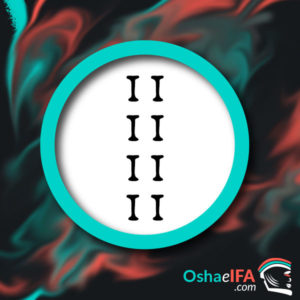Ogbe She: Meaning, Tips, Sayings, Patakies and More

Ogbe She is a sign of Ifa that is composed between the union of the two main Odu Ogbe and Oshe and occupies the 30th position in the Order of the Odu of Ifa.
Ogbe recommends us not to give up in the face of adversity since with hard work and perseverance the objectives can be achieved, this sign speaks of the Parrot's spots, these were caused by the other birds that tried to harm it but ended up giving it many colors that transformed it into the Olofin's Favorite Bird.
Ogbe She says that this person will buy a certain item that will make him sad. Ifá tells you not to feel bad because the article will ultimately become a source of wealth. This is however an item that represents a long-term investment.
Treaty of the Sign of Ifa Ogbe She
Other names of the odu Ogbe Oshe:
- Ogbe She.
- Ogbe Kowojo.
- Ogbe Sanwo.
In the odu Ogbe She is born:
- The revolver.
- The tattoo.
- Here in Ogbe She, the chain is lowered to the ground, the person is used and abandoned.
- The Salutation and the imploration to Olorun.
- The Secret of the Oboniboshe garment.
- The spy.
- The sons of Oshún do not put their hands on the heads of the sons of Shango.
- The Orisha, Adamu origin of Aguema.
- The one who Oba lost his ear
- Premonition in humans. The prophecy
- The position of Otolaryngologist
- The disease called Menier syndrome.
It may interest you: Ifa Oshe Nilogbe sign
Recommendations of the Ogbe She sign:
- Put 6 Torrejas to Orúnmila to solve.
- Put fresh fish to Ogún.
- Take care of your eyesight.
- Must live with people of definite color.
- Wear a flag necklace.
Ogbe She Sayings:
- The Awó never hurries, so as not to fail.
- Revolutionary liar.
- Of the moral man, his spirit does not die.
- The cart goes ahead of the oxen.
- He who has virtue is despised more than he who has a vice.
- The revolver, the tattoo is born, and that the works that are done to Shango, to solve problems, must be done at 4:00 in the morning.
Ogbe She bans:
- You don't drink sugar water.
- You don't work at night.
- No one blows afoshé.
- Ogbe She prohibits coloring her hair.
- You cannot bathe in the river because Olokun drowns you.
- The one who has a job and leaves something to do.
- Revolutionary liar.
- The moral man his spirit does not die.
- The cart goes ahead of the oxen.
- He who has no virtue is despised more than he who has a void.
The sign of Ifa Ogbe She speaks of:
- Put Elegba 5 musical instruments.
- When Awó is seen this Ifá (Ogbe She) must put to Oshún fufú pork meat and ekó.
- Don't offer what you can't deliver.
- Give a fresh fish to your head.
- Put crown with 16 Parrot feathers to Obatala. This was where the Toad plucked the tail feathers from the Parrot and gave them to Obatala for his crown.
- You have to be careful with the woman not knowing her secrets.
- You have to be splendid with the woman.
- That Obatalá fell ill and Oshún saved him.
- Of shots.
- Of teasing.
- Damn.
- Ogbe She is an Ifa of diseases of the Stomach, Viscera
- Talk about vision problems
- That you don't know friends
- That here they did not want to consider the Parrot but his meat is cancerous
- Oshún (Ibú Akuaro) speaks, the queen of laughter and falsehood. She is deaf when she doesn't want to hear, she lives outside.
Meaning of the Sign of Ifa Ogbe She
- Here the Parrot was the only one who understood Ogbe She because he was just like him.
- Limping because the owner of this Ifá is lame or has to be.
- What is the child in the arms of Oshun, that Oshún raised him.
- Here took place the war between Oduduwa and Olokun.
- White lives with black and black with white. You have to live with people of definite color.
- That you have to take care of your eyesight.
- Of a protective Egun.
- Of repulsion that the person is sometimes repudiated in places where they are not allowed to enter.
- Of money and of expiration of enemies.
- In Ogbe She the person is hurt out of envy or revenge.
- Pains in the leg
- That the person is saddened.
- Of cheating that he has bad eyes on him that he has to pray.
- That the person has to make a trip.
- Ogbe She talks about the inheritance of receiving large amounts of money from business or field.
- Of a spiteful person with revenge.
- Debts with Oshún.
- That the person has a hard head.
- Of things that the person is destined to do and due to adversities in life the person does not do it, it is avoided by giving a goat to Eshu a Rooster to Ogún and begging for his head.
- This was where Elegba made a pact and received teachings from Añá.
It may interest you: Odu Baba Ejiogbe
Ifa Ogbe She Sign Tips:
When Ogbe She leaves in Igbodun, the sacrifice that the chain refused to make is the first Ono Ifá or Odiha, which the person must perform to avoid going to earthly or heavenly jail before seeing the light of prosperity.
In ordinary divination, the person should be advised to serve his head, Ogún and Eshu with coconut, a rooster and a goat, to avoid the danger of unfinished luck. People born under this sign of Ifa are kind-hearted, they help their fellow men to the unheard of. In the same way, they destroy and annihilate when they feel cheated and offended, just cursing is enough to divert anyone who is a victim of their thoughts from their Ona Ifá.
In the Igbodun man must go into business and he will become very rich. If Ifá will require two Eshus (the traditional Eshu Obadara and the Eshu of water) to send the messages, they must be prepared with two separate goats. The person must be told that his luck had not been consolidated before preparing his Ifá.
In divination, the person must be told to tie a cowrie and 65 k of cloth, to be kept on his altar of Ifá. The Ifá priest will officially ask Ifá to pool his wealth, in order to flourish.
In Ogbe Oshe divination, he is told that he must make sacrifice to Ifá, Eshu and Olokun, as he is on the threshold of prosperity. The person born of this Odu should not eat poultry, goat, tiger, python and whale and not risk entering a burning house, to avoid showing ingratitude to his benefactors, for fear that he would always be a victim of the ingratitude of the beneficiaries of their own magnanimity.
Says Ifa Ogbe She
That money comes to you along the way, but first you have to take the money you have saved and pray so that you can defeat the enemy and advance and achieve that good that is already on the way. you had a bad dream, you no longer remember what you dreamed, and it was a bad dream, like a meal or a treat. be careful that they want to do a bad thing to you; out of envy or revenge
They are going to give him a red thing (damage). you feel pain in one leg and sometimes you feel sad, do not take things to heart, because that sadness can cost you your life. They are going to invite you to a meal, do not go because in that house they want to set a trap for you which consists in that they are going to set up two stalls. In a house there is an individual who does not let him lift his head, that person just by looking at him delays him
And so that you can take those eyes off you, you have to pray without loss of time. After you pray, you will have plenty of work; where you want to move to a bigger house.
You have to take a trip; but before leaving he has to pray.
You have to take an inheritance or a lot of money, it is like a country business. you are very spiteful, because when they do something to you, until you come, you are not satisfied. don't play with oshun and pay him what he owes you. Never offer what you cannot deliver, be careful not to get splashed with ink or paint in a meeting you are going to go to.
You have to do a favor and they will get scared.
Prayer of the Odu Ogbe She:
Ogbe She kantón obayé dewá kodidé saraundere olokukere ololodiye iyá lodé okeré yi moro enidesun epideremo otolarefa eyi boyó nila odu ayibagadara ñawasi, ñawasi ikowoshe iyá mi washeshiyami I died yeyeo asyehiy.
Ogbe She's Ebbo:
Secrets of Ogbe Oshe (8-5)
It is a garment called Aboniboshe, which is a 12 "tall doll, with a chain from the neck to the feet, it is given fresh fish blood, it eats with Ogún, Orúnmila and Egun.
Pine work
A hole is opened, the 16 Mejis, Oshe-Turá, Ogbe She, Okana Sa, Otura She are prayed and six reales, 4 chicken eggs are thrown and a Rooster is given. Ero, obi, kolá, osun naború, and a stone are thrown, that he eats with Shango, a pine tree is planted there to which a rooster is given every year and an Eshu of
sentinel.
Ogbe Oshe Impotence Remedies
A newborn goat is taken and a Rooster is given to Ogún wings 12 meridian, then 7 drops of blood of the goat and rooster are thrown on the person's limb, and with the crest and the leg of the rooster it becomes dust ( afoshé) and it is taken together with stallion vine and cinnamon all boiled, the body and head of the goat and rooster all go to a hill with 7 cents.
Herbs (Ewe) of the Oddun Ogbe She:
- Puffin Pine.
- Platanillo from Cuba.
- Cape of Ax.
- Cress.
- Sagebrush.
Treatise of the Oddun of Ifa Ogbe She
OGBE SHE OSOBO IKU
- Talk about shooting.
- He talks about how he can die of sadness.
- You can be drowned by Olokun.
OGBE OSHE BY DISEASE
- Talk about illness. This was where Oshún saved Obatala.
- Talk about stomach disease.
- Talk about sickness in the visors.
- Of sight problems.
- He suffers from one leg.
OGBE OSHE (8-5) OSOBO OFO
- Be careful not to lose your freedom.
- Be careful with one leg.
- Beware of traps so you don't lose your thing.
OGBE SHE OSOBO EYO
- Ifá of Jars of infidelity.
- Talk about shooting.
- Of Teasing.
- Of curses.
- Where no friends are known.
- Of thoughtlessness. Here they did not want to consider the Parrot.
- Talk about the war between Oduduwa and Olokun.
- Beware of a trap.
- Hard-headed person.
OGBE OSHE IN OSOBO OGU
- Talk about the person having bad eyes on him
- Beware of bad powders
- Talk about hurting the person out of envy or revenge
OGBE OSHE IRE ARIKU
- Talk about wealth of person of a lot of money.
- He talks about the inheritance of receiving a large amount of money from business in the field, etc.
- Ogbe She is the child in Oshún's arms, who raised him.
- That the person has a protective Egun.
OGBE SHE (8-5) IN IRE ASHEGUN OTA
- Talk about defeating enemies.
- That he has bad eyes on him.
- Talk about the person having to take a trip.
- The person has a protective Egun.
It may interest you: Ifa Iroso Umbo sign
Pataki of the sign of Ifa Ogbe She:
Who was Ogbe Oshe in Heaven.
OGBE SHE, in Heaven, was called Igbera-Orun, which means "He raised his head and shoulder above his enemies."
He was also called: OGBE SANWO: He who distributes fortune to men on Earth.
OGBE KOWOJO: The money man.
This Odu was the one who revealed how money came to be established, anyone born under the patronage of this Odu; »She is destined to be immensely wealthy and prosperous, provided she serves ORUNMILA.
He, however, will have initial problems with his family, because many enemies follow him around the World to thwart the realization of his destiny. However, if he makes the proper preparation through the required sacrifices (Ono Ifá Odiha); He will raise head and shoulder above his enemies (Igbera Orun).
The Celestial Works of Ogbe Oshe. He made divination from the chain.
The chain (eghan in Beni and Seke in Yoruba) was feared by all without exception in Heaven. Despite his power, she (he) was very poor. She (he) was called Seje Aroju Elebaa. When his poverty became unbearable, he turned to Ogbe Ose, who was called Igbera Orun, for a divination. He was advised to sacrifice a goat to Eshu, 0 rooster for Ogun and coconut for his head.
He was offended because he was able to support both divinities and mortals, as well as animate and inanimate objects, he could not deign to sacrifice to just anyone. He remained in his poverty. His work in Heaven was as Chief Jailer, the one who had custody of all delinquent sinners.
The sacrifice that he was required to make was to avoid or evade the danger of fate not consummated, that is, Amubo in Yoruba and Osobo-no-masuno in Beni. Despite the diligence with which he carried out his task, he found that he did not receive any compensation for his work. Those who were kept in his custody were acquitted after trial, fined, released or executed if the offense carried the death penalty. After the defendant had been prosecuted, the chain was emptied again. His frustration became so unbearable, that he decided to come into the world. Yet he made the sacrifice. While, in Heaven, he was a disciple of the Iron Divinity (Oggun).
Upon entering the world, he continued his work as a guard for accused persons and other organic and inorganic substances awaiting trial or execution. The animals that were waiting for the slaughter, were placed in his custody, he tied them by the neck, by the body or by the legs. As soon as the fate of his prisoners was determined and they were to be consigned for sale, slaughter, or sacrifice, he was asked to release them, ungratefully, without any reward.
When the accused were handed over to him to keep in custody, awaiting trial or
execution, they were released from their custody without any ratification. The degree of ingratitude was such that it was
used over and over without compensation. He never received words of thanks from his victims or his mentors.
That is why it is said that no one should beg to suffer the fate of the chain, who works without any
thanks and stands aside after doing her job, until she is requested for another.
She was happy every time they brought her to take care of a human being or an animal, because that way she had slaves to use. But soon his prisoners were released and he began to stubbornly lament, for refusing to make the sacrifice in Heaven against unfinished achievements (Amubo and Osobo no masuno).
LACURIOSITY OF THE OBINI OF ODE
EBBO: Euré okan, adie meyi, asho funfun, bogbo tenuyen, other ingredients, opolopo owo.
Odu Ogbe She's Patakin (8-5)
Odé had neither money nor food, he went to Orunmila's house and Ogbe She saw him, marking him ebo, which with many sacrifices he was able to make. Ode returned to the forest and saw from the top of a tree a large herd of Agbaní, who had large horns. They were all at the bottom of a joro-joro on earth. These Agbaní invoked Olorun and when they spoke magic words Olorun opened and they entered.
Then Ode, who was going to shoot him with his bow, heard a voice that was Elegba that said to them: I defend you. Look at the words they say to Olorun, learn them and with them you can do the same as them. Ode spent three days watching the Agbaní and learning his suyere. Finally taking advantage of the fact that they left, he went down and did everything, entering inside Olorun. Finding himself inside with great riches, taking from there two rolls of ashó funfun and a sack of Emerald and Gold. Elegba told him: You cannot say anything to anyone about this.
When he got back to his house, he gave his Obini, the two rolls of fabrics and she asked him: Where did you get this from, and Ode did not answer, but she insisted several times, without any results. The Agbaní returned and upon entering they noticed the lack of Gold, the Emeralds and the Asho. They said: Someone has been here in our absence. Who will be the bold man who has done this? One day in the absence of Ode, his wife got into her husband's traveling bag, using her magic, since she was a sorceress. He made a small hole in it to see, Ode, ignorant of this, slung his bag over his shoulder and went hunting. His wife saw everything Ode did, coming out of hiding and waiting for Ode to leave, she performed the same operation. But he entertained himself looking at the treasures and the Agbaní arrived and
they took her prey. They tied her to an igui Araba, at the entrance of a joro-joro, which communicated Aiye with Olorun.
Ode, seeing that his Obini was not in his ilé when he returned, waited for her, but on the third day when he saw that she was not coming, he went looking for her. The Agbaní had agreed to kill her and they went out in procession, dancing with her inside the horns. Ode, who saw her, pointed his akofá and killed one of the Agbaní loa.
He rescued her, gave her Gold and Esmeralda and gave her back to the family saying: I don't love her anymore, she is indiscreet. And he wants to know what he can't.
So Ode was very rich with all the treasure of Olorun.
Note:
You have to be careful, that the obini does not know its secrets. Odu of wealth. You have to be splendid with the obini.
Ogbe She Ifa Traditional
OGBÈ I KNOW
I know yeshìín
I know sóhùún
Lomi koto è é fií kún
Tíí fií wonú ile
Today I will Odíderé
Ti n fosù gbogbo sòwò èjè
I will hate ní n se nnkan ni ò lórí yìn
Are you still nnkan rere báyìí?
Wón ní kí Odíderé or rubo
Wón ní gbogbo nnkan è ní or bára mu
I'll hate bá rbo
Ó rbo tán layé bá ye é
Gbogbo nnkan ti ò ti daa
You or you lajé
Ti or ti bímo
Osù gbogbo ní fí n sòwò èjè
Wón ní kó tjú nnkan ìponmi
Ni inú è n dùn
N ní wá n jó ní wá n yò
N ni n yin àwon Babaláwo
Àwon Babaláwo n yin Ifá
Ó ní béè làwon Babaláwo tòún wí
I know yeshìín
I know sóhùún
Lomi koto è é fií kún
Tíí fií wonú ile
Today I will Odíderé
Ti n fosù gbogbo sòwò èjè
yóó dome
Òwò èjè kan òwò èjè kan
Táwa se lósu yìí
yóó dome
Omo ní or mòmò dà.
Ifá says in Ogbe She, this person had tried to do various things with his hands, but had not been successful. Ifá says that he will be successful, but he must offer the sacrifice. He should bring a container and use it to carry water to Esu's side.
The way it spills out here
And it spills there
It is the reason why the water in a koto can never be filled
When you get home
You guessed for Odíderé
The one who trades in blood every month.
Odíderé had been doing all things without succeeding.
Would I be able to do something good? She asked.
They asked her to offer the sacrifice.
They told her that her things will be given as she wished
Odíderé made the sacrifice
She finished watching the sacrifice and life pleased her.
All the things she never succeeded in
She had never had the wealth.
She had never had children.
She started dealing with blood every month.
Later they asked him to prepare a container of water.
And I use it as a sacrifice.
They offered the sacrifice to Èsù
The feathers on his tail became a source of wealth.
She became very happy
She danced with joy.
She praised her Babaláwos.
Their Babaláwos praised Ifá
She said, that was exactly what her Babaláwos predicted
The way it spills out here
And it spills there
It is the reason why the water in a koto can never be filled
When you get home
You guessed for Odíderé
The one who trades in blood every month.
It will turn into a baby.
A certain blood trade.
What we do this month.
It will turn into a baby.
It will surely turn into a baby.
You may be interested in:














